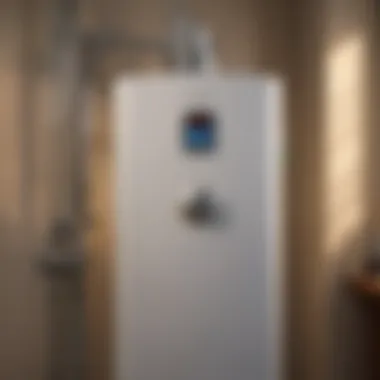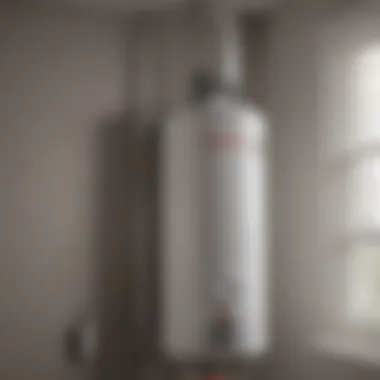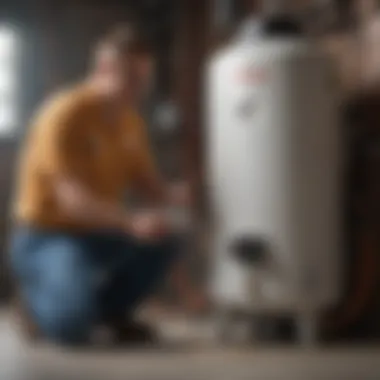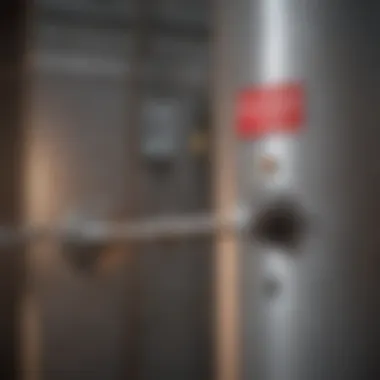Understanding Power Vent Propane Hot Water Heaters


Intro
When it comes to home improvement, choosing the right hot water system can significantly affect energy costs and comfort in your household. Power vent propane hot water heaters have gained popularity due to their efficiency and ability to fit in various locations. Understanding these systems is crucial for homeowners seeking reliable and effective solutions. This section presents an overview of power vent propane hot water heaters, outlining their functionality and importance in modern households.
Power vent propane hot water heaters utilize a fan to vent exhaust gases, allowing them to operate in spaces without traditional venting systems. This feature makes them versatile, as they can be installed where it would be impractical to have a typical chimney. As energy efficiency becomes a greater concern for many homeowners, these systems offer an excellent balance of performance and lower utility bills.
The rising need for energy-efficient systems highlights the significance of power vent propane hot water heaters in the home improvement industry. They not only meet the hot water demand but also contribute to reducing the home's carbon footprint.
Importance of the Topic
Understanding the nuances of power vent propane hot water heaters is vital for homeowners looking to make informed decisions. Familiarity with performance metrics and technical specifications will empower individuals to navigate their options confidently. Further, guidance on installation, maintenance, and troubleshooting provides practical knowledge, ensuring that the heater performs optimally throughout its lifespan.
Intro to Power Vent Propane Hot Water Heaters
Power vent propane hot water heaters are becoming increasingly relevant. With the growing interest in efficient home heating systems, understanding their features and benefits is essential. These heaters not only supply hot water but also do so with enhanced efficiency. In this part of the article, we will address key aspects that make power vent propane systems notable choices for homeowners and their unique operational needs.
Definition and Overview
A power vent propane hot water heater is a device that heats water using propane as fuel. It incorporates a fan or blower to expel combustion gases from the unit. This design is especially useful when traditional venting systems are not practical. It brings versatility in installation; for instance, it can be placed in tighter spaces compared to conventional water heaters. The power vent system ensures that the unit operates safely by efficiently venting gases outside the home.
Benefits of Using Propane
Propane offers several advantages that can appeal to discerning homeowners.
- Efficiency: Propane burns hotter than electricity, leading to quicker water heating. This can reduce waiting times for hot water in households.
- Cost-Effective: Propane is often cheaper than electricity, translating to lower monthly utility bills.
- Environmentally Friendly: Burning propane results in fewer carbon emissions compared to some fossil fuels. This can contribute to better air quality.
- Versatility: Propane can be used for other household appliances, allowing for a seamless energy source across the home.
"Choosing propane can not only enhance heating efficiency but also contribute to sustainable energy use in the home."
These benefits position power vent propane hot water heaters as an efficient solution for homeowners looking for reliable hot water systems.
Operational Mechanisms
Understanding operational mechanisms is vital for evaluating power vent propane hot water heaters. These heaters stand out due to their unique venting systems, which not only enhance their efficiency but also provide flexibility in installation. By grasping how these mechanisms operate, homeowners can make informed decisions that suit their heating needs.
How Power Venting Works
Power venting employs an electric fan to expel exhaust gases from the water heater, unlike conventional models that rely on natural draft. This system is beneficial because it can vent through a range of materials and allows for longer horizontal runs. The electric fan is powered through electrical connections, and its operation can significantly impact the overall efficiency of the heater.
When the thermostat activates, the burner ignites, heating the water. As the hot gases rise, the fan pushes them out safely through vent pipes. This mechanism ensures that the water heater operates effectively in various locations, including spaces that lack traditional venting options.
The power vent setup also minimizes heat loss, increasing energy efficiency. It enables these heaters to be installed closer to exterior walls as they don’t rely solely on verticality for venting. Thus, the operational design supports versatility in placement, making them suitable for various home layouts.
Comparison with Conventional Venting
Conventional venting systems utilize natural draft, which means the exhaust gases rise due to temperature differences. This system, while reliable, often has limitations of placement and inefficiencies based on nearby structures.
On the contrary, power vent systems offer several advantages:
- Flexibility: With no strict vertical venting requirements, power vent heaters can be located in tight spaces or basements without worries about venting direction.
- Efficiency: The fan improves exhaust removal, reducing heat loss and potential condensation issues.
- Safety: Better control of exhaust flow minimizes risks associated with buildup of harmful gases.
However, they also demand a few more considerations:
- Electrical Dependency: Power vented heaters require a constant electrical supply, which should be considered during installation.
- Potential Noise: The fan can create a noise element, which some users might find noticeable.
Overall, comprehending these operational mechanisms not only aids in maintenance but also enhances the heating experience in residential settings.
Power vent propane hot water heaters represent a significant evolution in water heating technology, focusing on efficiency and operational flexibility.
Technical Specifications
Understanding the technical specifications of power vent propane hot water heaters is paramount for both prospective buyers and existing users. This section provides insight into the crucial elements that influence the performance, efficiency, and longevity of these systems.


Technical specifications serve as a guideline for evaluating different models and brands. They encompass various aspects such as capacity, power input, venting options, and recovery efficiency. A clear grasp of these elements can lead to informed decisions, ultimately enhancing the functionality of the water heating system.
Key Features
Power vent propane hot water heaters come equipped with several key features that distinguish them from traditional units. Some notable features include:
- Power Venting: This allows efficient removal of combustion gases using a fan, making it possible to vent through walls instead of roofs.
- Faster Heating: Generally, these heaters heat water more rapidly compared to their electric counterparts. This efficiency ensures a more readily available hot water supply.
- Adjustable Thermostat: Many models include an adjustable thermostat that provides control over water temperature. Homeowners can set their preferences, optimizing comfort and energy use.
- Durable Construction: A solid construction often incorporates rust-resistant materials, extending the lifespan of the unit.
These features enhance their appeal, enabling users to enjoy benefits such as improved energy efficiency and greater installation flexibility.
Efficiency Ratings
Efficiency ratings are essential indicators of a water heater's performance. For power vent propane heaters, look for the Energy Factor (EF) rating. This measurement provides insight into how effectively the heater converts fuel into hot water—an EF rating closer to 1 signifies a more efficient unit.
In addition:
- Annual Operating Costs: Higher efficiency typically translates to lower operating costs over time. This can be significant for homeowners managing utility expenses.
- Environmental Impact: More efficient systems often have a smaller carbon footprint due to reduced fuel consumption, aligning with environmental regulations.
Understanding these ratings allows individuals to evaluate options based on efficiency. This understanding is crucial for making choices that are not only financially sound but also environmentally responsible.
Installation Guidelines
The process of installing a power vent propane hot water heater is critical to the system's overall performance and longevity. Proper installation ensures the unit functions efficiently, which directly relates to energy savings and safety. This section covers specific elements to consider during the installation process, including site preparation, connection to the propane supply, and electrical wiring.
Site Preparation Requirements
Before beginning the installation, it is essential to assess the location where the heater will be placed. The area must be well-ventilated and unobstructed to allow for smooth operation. The surfaces should be level and capable of supporting the weight of the water heater when full.
Proper clearance around the unit is also important. It should have enough space for maintenance and repairs. The following elements should be evaluated:
- Access to ventilation: Ensure that the power venting system has an adequate path for expelling gases outside.
- Proximity to the propane source: A shorter distance to the propane fuel supply can reduce installation complexity and costs.
- Drainage capabilities: If leaks occur, it's critical that water can flow away safely to avoid damage to the surrounding space.
Connection to Propane Supply
Establishing a proper connection to the propane supply is a fundamental component of the installation process. A secure connection is vital for the efficient operation of the hot water heater. Here are key points to consider:
- Use of proper fittings: Make sure to use fittings and regulators that are compatible with propane to avoid leaks and inefficiencies.
- Pipe sizing: Ensure that the gas pipes are adequately sized to deliver the necessary volume of propane needed for the heater.
- Leak detection: After connection, conduct a thorough inspection for any potential gas leaks using soapy water. Any bubbling indicates a leak that must be addressed immediately.
Electrical Wiring for Power Venting
The electrical components of a power vent propane hot water heater are crucial for its operation. The venting system requires an effective electrical supply to run fans and blowers. Here are several considerations for wiring the system:
- Compliance with electrical codes: Adhering to local and national codes is important for safety and legality. Ensure that the electrical components are rated for the appliance's requirements.
- Dedicated circuit: Ideally, the heater should be on its own circuit to avoid conflicts with other appliances that might cause overload.
- Professional assistance: If you are uncertain about electrical work, it is best to hire a qualified electrician. Proper installation of wiring ensures more reliable operation.
Proper installation not only optimizes performance but also enhances safety and prolongs the lifespan of your equipment.
Following these installation guidelines will contribute to a successful and safe operation of your power vent propane hot water heater.
Maintenance and Troubleshooting
Proper maintenance and troubleshooting are crucial for ensuring the longevity and efficiency of power vent propane hot water heaters. Regular attention to these elements can prevent faults and prolong the lifespan of the unit. It also enhances safety by signaling any potential issues before they escalate. This approach saves money over time by avoiding costly repairs or replacements that could arise from neglect.
Routine Maintenance Practices
Routine maintenance is essential for keeping your power vent propane hot water heater functioning optimally. It typically involves the following practices:
- Regular Inspections: Schedule professional inspections at least once a year. This helps to catch any problems early.
- Flushing the Tank: Sediment build-up can cause inefficiencies and overheating. Flushing the tank every six months to a year can minimize this.
- Checking Valves and Connections: Inspect all valves and connections for signs of corrosion or leaks. Replacing worn or damaged parts promptly is essential.
- Ventilation Checks: Ensure the ventilation system is clear of obstructions. Blocked vents can cause dangerous gas build-up.
- Testing the Pressure Relief Valve: This valve should be tested regularly to ensure it functions properly. It is a key safety feature that prevents excessive pressure build-up in the tank.
By implementing these practices, homeowners can ensure their hot water heaters remain efficient and safe to operate.
Common Problems and Solutions
Even with regular maintenance, problems can still arise. Awareness of these issues can help homeowners address them quickly:


- Insufficient Hot Water: This may indicate sediment build-up, a faulty thermostat, or a malfunctioning heating element. Flushing the tank and checking the thermostat settings are recommended first steps.
- Strange Noises: Noises such as popping or rumbling often suggest sediment accumulation in the tank. Flushing the tank may resolve this issue.
- Water Discoloration: If the hot water appears rusty, it may indicate corrosion inside the tank. An immediate inspection is advisable, and replacement may be necessary.
- Gas Odors: Any smell of gas is serious. Evacuate the area, and contact a professional to inspect the system. Do not attempt to troubleshoot this issue on your own.
By being proactive and responsive to these common issues, homeowners can maintain their power vent propane hot water heaters effectively, ensuring continued functionality and safety.
"Regular maintenance is not just a recommendation; it is a necessity for safety and efficiency."
Following these steps allows you to enjoy hot water without unexpected interruptions, ultimately leading to a more comfortable home environment.
Safety Considerations
When dealing with power vent propane hot water heaters, understanding safety considerations is paramount. This ensures that homeowners are fully aware of the risks involved and how to mitigate them effectively. The use of propane introduces specific challenges that warrant careful attention, not only for the equipment's efficacy but also for the overall safety of the home environment.
One of the most critical aspects of safety is gas leak detection. Propane is a colorless and odorless gas, which makes it particularly insidious. For this reason, propane suppliers add a distinct smell to the gas, commonly described as a rotten egg scent. Having proper gas leak detection systems in place is vital.
Homeowners should consider installing propane detectors at strategic locations throughout their home. These detectors can provide an early alert to dangerous leaks and help in taking prompt action, possibly preventing catastrophic outcomes. Regular maintenance and checks of the propane infrastructure are also prudent.
Gas Leak Detection
Gas leak detection mechanisms are essential to secure safe operations of power vent propane hot water heaters. The efficiency of these systems directly relates to their placement and sensitivity. Homeowners must ensure that detectors are installed close to possible leak points. These points generally include:
- Connection fittings
- Tanks or cylinders
- Valves
Routine testing of the detectors should not be overlooked. If a detector has not triggered for an extended period, it is advisable to verify whether it is functioning correctly.
In addition to nearly mandatory gas detectors, homeowners should also engage with local propane suppliers regarding regular inspections of their propane appliances. Awareness of the signs of a leak, including hissing noises or dead vegetation near the source, can also be invaluable. Moreover, a well-informed family will significantly improve overall safety; everyone should know emergency procedures in case a leak is suspected.
Regular monitoring for gas leaks not only ensures the safety of your home, but also promotes the longevity of your propane appliances.
Burn and Fire Risks
Burn and fire risks are an inherent aspect of using power vent propane hot water heaters. Recognizing these risks enables proactive measures to minimize them. The system operates under high temperatures, which necessitates adequate clearances around the heater to prevent fires.
Important considerations for minimizing burn and fire risks include:
- Space Management: Maintain at least three feet of clearance around the unit.
- Proper Ventilation: Ensure the area is well-ventilated to dissipate heat and prevent the buildup of combustible gases.
- Regular Maintenance Services: Schedule inspections for the heater to check for wear or damage, as even minor issues can lead to serious risks.
Understanding the fire hazards linked to propane usage necessitates proper handling during any maintenance procedure. This includes shutting down the gas supply and ensuring that no flammable materials are in proximity to the heater. A significant awareness of the risk factors can significantly help in adopting safer practices.
In summary, safety considerations play a crucial role in preserving the integrity of power vent propane hot water heaters. By focusing on gas leak detection, addressing burn and fire risks, and fostering an environment of safety awareness, homeowners can enjoy the advantages of propane hot water heaters while mitigating the associated dangers.
Regulatory Compliance
Regulatory compliance is a critical aspect of installing and using power vent propane hot water heaters. It encompasses the adherence to various local and national standards designed to ensure safety, efficient operation, and environmental protection. Understanding these regulations is not just about conforming to the law; it also means protecting your property and loved ones from potential hazards.
Local and National Codes
Local and national codes govern the installation and maintenance of propane water heaters. These codes often include specifications about venting, clearances, and gas connections. Compliance with these codes ensures overall safety and performance of your water heating system.
- Venting Requirements: Proper installation often requires specific vent sizes and configurations. This is essential for efficient operation and to prevent backdrafting, which can lead to gas buildup in your home.
- Gas Line Specifications: Local codes may dictate the materials and sizing of gas lines leading to the water heater. Adhering to these requirements can prevent leaks and enhances system reliability.
- Safety Clearances: Regulations often set safety clearance distances required around the heater to minimize fire risk. Ensure that your installation meets these specifications to avoid potential safety hazards.
- Professional Installation: Some jurisdictions require licensed professionals to install gas appliances. This not only guarantees compliance but also enhances the safety of your installation.
Understanding and following local and national codes is essential. It ensures that your system operates efficiently and safely, and contributes positively to your home's overall compliance with insurance and resale conditions.
Environmental Regulations
Environmental regulations govern the emissions and waste produced by propane water heaters. These guidelines aim to minimize the ecological impact and promote sustainable practices within the industry.
- Emissions Standards: Propane systems must meet specific emissions levels set by national and local environmental authorities. Compliance ensures that your system's emissions remain within acceptable limits, contributing to improved air quality.
- Energy Efficiency Regulations: Many regions have enacted laws promoting energy-efficient appliances. Water heaters that meet these standards not only help the environment but can also reduce utility bills over time.
- Proper Disposal: Adhering to regulations regarding the disposal of old appliances is crucial. Many localities enforce strict rules about how to dispose of propane tanks and older equipment to prevent environmental damage.
- Incentives for Compliance: Some areas offer incentives, such as rebates, for homeowners who install energy-efficient systems. Understanding these opportunities can provide financial benefits while adhering to regulations.
Adhering to environmental regulations is vital. It helps protect natural resources and contributes to a more sustainable future.
"Following regulatory compliance not only safeguards your investment but also ensures a healthier environment for generations to come."
Cost Analysis


Cost analysis is a crucial component when considering power vent propane hot water heaters. Understanding the financial implications—including initial investment, installation expenses, and long-term operating costs—allows homeowners to make informed decisions. As energy efficiency becomes increasingly important, knowledge of these costs can also highlight potential savings over time.
Initial Investment and Installation Expenses
When you choose to install a power vent propane hot water heater, several factors contribute to the initial investment. First, the price of the unit varies significantly based on its brand and features. Generally, high-efficiency models tend to cost more upfront but they can offer better energy savings in the long run.
Installation is another significant cost element. Unlike conventional heaters, power vent models require more sophisticated installation processes due to their venting systems. Expenses may increase if alterations to existing plumbing or electrical systems are necessary. Engaging a licensed professional for installation is also advised for safety and compliance, which adds to labor costs.
Consider the following:
- Cost of the Heater: Ranges based on capacity and efficiency ratings.
- Installation Fees: Pay for both labor and materials, might fluctuate based on local market conditions.
- Permitting: Certain areas require permits for installation, which can come with additional charges.
Long-term Operating Costs
Long-term operating costs include the monthly expenses associated with running the system, which are important for budgeting. Power vent propane hot water heaters are typically more efficient than electric alternatives, translating into lower monthly utility bills. However, propane prices can be volatile, so it's essential to monitor market trends.
To accurately assess long-term costs, consider:
- Energy Consumption: Evaluate the annual usage based on household hot water demand. A more efficient unit will use less propane.
- Maintenance: Routine maintenance is essential for optimal performance. Annual service checks can prevent costly repairs.
- Replacement Parts: Factor in potential expenses for parts that may need to be replaced over time due to wear and tear.
By carefully analyzing both initial and long-term costs, homeowners can make strategic decisions regarding their power vent propane hot water heater.
Comparative Studies
Comparative studies play a crucial role in understanding the dynamics of power vent propane hot water heaters in relation to other heating systems. This section provides insights into key comparisons, facilitating informed choices for homeowners seeking efficient water heating solutions.
When evaluating hot water systems, it is important to consider factors such as energy source, operational efficiency, installation costs, and long-term performance. Comparative analyses help clarify the benefits and limitations of different types, allowing homeowners to make decisions that suit their needs.
Propane vs. Electric Water Heaters
In this comparison, propane and electric water heaters each have distinct advantages.
- Energy Efficiency: Propane heaters generally offer higher energy efficiency than electric models. They often heat water quicker and maintain temperature better, reflecting a better performance under heavy demand.
- Operating Costs: While the initial cost of propane heaters may be higher, their efficiency can lead to lower monthly utility bills. Conversely, electric heaters usually are less expensive upfront but can result in higher operating costs over time due to higher electricity rates.
- Environmental Impact: Propane is considered cleaner burning compared to many fossil fuels. However, compared to electric systems, the environmental impact largely depends on the local energy sources used for electricity generation.
- Installation Feasibility: Installing propane heaters may present more logistical challenges, including venting requirements. Electric heaters typically require less setup, making them easier to install in various locations.
Overall, while propane heaters can offer advantages in efficiency and cost over time, electric models can be simpler and less complex to set up. It is essential for homeowners to weigh these differences based on their specific situations.
Efficiencies Compared to Other Fuels
When evaluating efficiencies, it's vital to compare not only propane and electric but also to include natural gas and solar energy in the discussion.
- Natural Gas: Natural gas water heaters provide similar efficiency to propane but usually at a lower fuel cost. However, they may require a natural gas line, which can limit their applicability depending on property location.
- Solar Energy: Solar water heaters can offer significant savings in operating costs, but they require a substantial upfront investment and a sunny climate. Their performance can vary widely based on location and installation.
- Oil Heating: Oil burning systems offer good efficiencies as well but have fluctuating fuel prices, and the storage requirements can be cumbersome for homeowners.
Understanding the efficiencies of these various fuels helps in determining not just immediate costs but also long-term sustainability and feasibility.
The choice of a hot water heating system should reflect personal needs, local resources, and environmental considerations.
Finale and Future Directions
In discussing power vent propane hot water heaters, it is essential to recognize the significance of future advancements in the field. As technology evolves, so do the capabilities of these water heating systems. It is critical for homeowners and professionals to stay informed about these developments to optimize their systems fully while considering their specific needs.
One of the key aspects of this section is the emphasis on efficiency improvements. Enhanced insulation materials, better combustion technology, and intelligent controls can all contribute to increased performance levels, leading to significant energy savings. This is especially relevant as energy costs continue to fluctuate, making it vital for homeowners to find solutions that not only meet their current needs but also support long-term sustainability.
Moreover, regulatory changes are likely to impact future installations. Understanding upcoming legislation can help consumers make informed decisions and ensure they remain compliant with local codes. Knowledge of these regulations can be a valuable asset, particularly in regions targeting ambitious environmental goals.
Sectioning off the focus on emerging technologies deserves attention. Innovations like smart water heaters that connect with home networks can transform the way households manage their water heating, allowing for greater control and efficiency. As systems become more interconnected, homeowners can monitor performance and make adjustments in real time.
Ultimately, the future of power vent propane hot water heaters is bright, provided users remain engaged and proactive in their choices. This section offers insight into the trajectory of technology and its direct benefits to energy efficiency and environmental responsibility.
Summary of Key Points
- Continuous advancements in technology can lead to improved efficiency in power vent propane hot water heaters.
- Staying abreast of regulatory changes helps users remain compliant and informed.
- Innovations like smart connectivity can enhance user experience and system performance.
- Energy savings and sustainability are crucial considerations for future investments.
Emerging Technologies in Water Heating
The emerging technologies in water heating present a considerable opportunity for innovation in power vent propane hot water heaters. As the industry progresses, several technologies are gaining traction.
- Smart Technology: Internet of Things (IoT) implementation allows users to control and monitor their hot water systems remotely. This can lead to greater efficiency and customization.
- Condensing Technology: Newer models utilize condensing techniques for increased efficiency, capturing exhaust heat and reusing it in the heating process. This innovation minimizes energy loss and enhances performance.
- Hybrid Systems: Hybrid options combine different fuel sources, such as solar and propane, providing more flexibility and reducing reliance on a single energy source. This adaptability supports energy conservation efforts.
- Upgraded Sensors: Advanced sensors can provide real-time feedback for diagnosing potential issues, ensuring the systems operate at optimum levels and reducing the risks of sudden failures.
As these technologies continue to develop, users can expect increased efficiency and enhanced functionality from their power vent propane hot water heaters.







